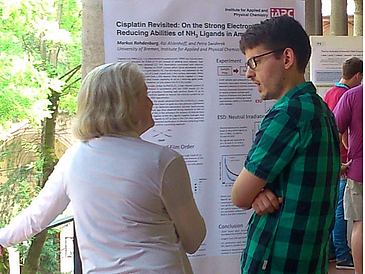Focused electron beam induced deposition (FEBID) is a precise direct-write state-of-the-art nanofabrication tool. For utmost performance to be achieved, however, the underlying chemical processes must be controlled. This is because FEBID produces the nanomaterials by decomposing suitable molecules under the electron beam. When aiming at metallic deposits, FEBID typically applies metal organic molecules. These contain an atom of the desired metal surrounded by organic groups that provide the molecule with a sufficient volatility so that the vapour can be dosed onto a surface for FEBID. Unfortunately, the organic material is often not fully removed in FEBID resulting in deposits that contain, beside the desired metal, unwanted quantities of carbon and other elements.
To advance FEBID, new and specifically designed molecules or novel deposition processes must be developed. The latter aim at producing deposits with high metal content and thus precisely controlled physical properties from molecules that are by itself not optimal for FEBID but readily available. The PhD thesis of Dr. Markus Rohdenburg (now at the University of Leipzig) is focused in particular on such novel FEBID processes and their underlying chemistry. The thesis derives from work performed at the IAPC (University of Bremen) and during collaborative visits at the Austrian Centre for Electron Microscopy and Nanoanalysis (FELMI-ZFE) at the Technical University of Graz and at the University of Technology in Sydney (Australia) and has been supported by further international partners. It will be awarded a special prize from Bruker Daltonics GmbH & Co. KG in the field of natural and engineering sciences during the Bremen Thesis Award ceremony on March 1, 2022.
Universität Bremen
Fachbereich Biologie / Chemie
Institut für Angewandte und Physikalische Chemie
Prof. Dr. Petra Swiderek
Tel. 0421 218 63200
E-Mail: swiderek@uni-bremen.de
Webseite: https://www.iapc.uni-bremen.de/swiderek/

